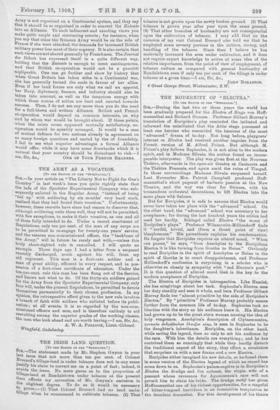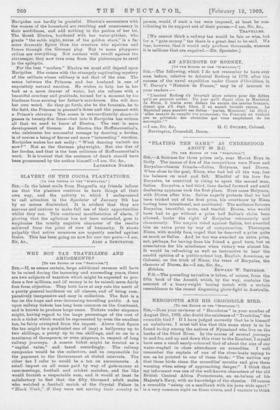THE MODERNITY OF " ELECTRA?
[To THE ENTINE 05 THIC .SPECTATOR."] Sin,—During the last two or three years the world has been gradually prepared for the Electra of Hugo von Hoff- mannsthal and Richard Strauss. Professor Gilbert Murray's translation of Euripides's play reminded the initiated and informed the uninitiated that the Attie stage possessed at least one heroine who resembled the heroines of the most " advanced" drama of to-day. Not long before, playgoers' interest in Electra had received another impulse from the French version of M. Alfred Poizat. But although M. Poizat's play follows Sophocles, it is not alien to the modern spirit, and in Madame Silvain the author found an incom- parable interpreter. The play was given first at the Nouveau Thatre, afterwards iu the open-air theatre at Cauterets and the ThiSiltre Francais, and again amid the ruins of Timgad. In those surroundings Madame Silvain surpassed herself. Last November Mrs. Patrick Campbell produced Hoff- mannsthars short pageant of barbaric passion at the New Theatre, and the way was clear for Strauss, with his tremendous orchestral decorations, to lift Electra into the same plane with Salome.
But for Euripides, it is safe to assume that Electra would never have taken her place with the " advanced " school. On the other hand, the "advanced" school was necessary to her acceptance ; for during the last hundred years the critics had used her hardly. Schlegel called Electra "the worst of Euripides's plays." Professor Wilainowitz-Mollendorff finds it " sordid, trivial, and (from a Greek point of view) blasphemous." His parenthesis explains his condemnation. He forgets that Euripides requires an altered mood. " When one passes," he says, "front Aeschylus to the Euripidean Electra it is like turning from Goethe to Heine Obviously to read Euripides in the spirit of Aeschylus or Heine in the spirit of Goethe is to court disappointment, and Professor Mollendorff's confession is surprising in a scholar who is otherwise so closely in sympathy with "sad Electra's poet." It is this question of altered mood that is the key to the modern acceptance of Euripides.
The Electra of Euripides is introspective. Like Hamlet, she has misgivings about her task. Sophocles's Electra sees her duty steadily and sees it whole, and here Professor Gilbert Murray finds her "almost primitive by the side of Euripides's Electra?' By " primitive " Professor Murray probably means further from the common life of to-day. Sophocles took no liberties with the story as his audience knew it. His Electra had grown up to be the great stern woman nursing the idea of holy vengeance. Aeschylus's description of Clytemnestra,
yvvaisOr ciapcigoeXov afrcCov 'ciao, is seen in Sophocles to be the daughter's inheritance. Euripides, on the other hand,
while saving the legend, does so only to set his audience by the ears. With him the details are everything ; and he has contrived them so cunningly that while they hardly disturb the traditional aspect of the story, they effect a revolution that surprises us with a new drama and a new Electra.
Euripides either imagined his new details, or he-found them in some version of the Electra legend of which ne record has come down to us. Sophocles's palace-captive is in Euripides's
Electra the drudge and the outcast, the virgin wife of a peasant whose reverence for Agamemnou's race will not permit him to claim his bride. The drudge motif has given Hoffmannsthal one of his richest opportunities, for a stageful of bitter-tongued harridaes is an irresistible temptation to the decadent dramatist. For this development of his theme
Euripides can hardly be grateful. Electra's encounters with the women of the household are revolting and unnecessary in their sordidness, and add nothing to the pathos of her lot. The creek Electra, burdened with her water-pitcher, who greets "the sable night, nurse of the golden stars," is a far more dramatic figure than the creature who squirms and fumes through the German play. But to some playgoers critics are everything. Not content with revolt against the statuesque, they now turn even from the picturesque to revel in the epileptic.
For the beat "modern" Electra we must still depend upon Euripides. She enters with the strangely captivating mystery of the celibate whose celibacy is not that of the nun. The scene between the Princess and her husband is one of exquisitely natural emotion. He wishes to help her in her task as a mere drawer of water, but she refuses with a beautiful courtesy and gratitude, turned for a moment by his kindness from cursing her father's murderers. She will dree her own weird. So they go forth, she to the fountain, he to the field, the Princess in peasant's dress and the peasant with a Prince's chivalry. The scene is extraordinarily short—it passes in twenty-five lines—but into it Euripides has written all that we need to know of Electra. The rest is mere development of themes. An Electra like Hoffmannstlial'a, who celebrates her successful revenge by dancing a kordax, is of course a being of fiercer and more " interesting " emotion. Euripides makes her ask sadly: " What dancing waiteth me now?" Not so the German playwright. But she dies of her kordam, and that is the best criticism of Hoffmannstbal's work. It is ironical that the sentence of death should have been pronounced by the author hivaself.—I am, Sir, &c.,
LAURENCE NORTH.










































 Previous page
Previous page